Ethical Issues of Unemployment Due to Artificial Intelligence
VerifiedAdded on 2023/06/13
|6
|1233
|246
AI Summary
This article discusses the ethical issues associated with the use of AI and increasing unemployment. It covers the impact of AI on various sectors such as business, education, security, and defense. It also discusses the positive and negative consequences of AI from the perspective of preference utilitarianism.
Contribute Materials
Your contribution can guide someone’s learning journey. Share your
documents today.
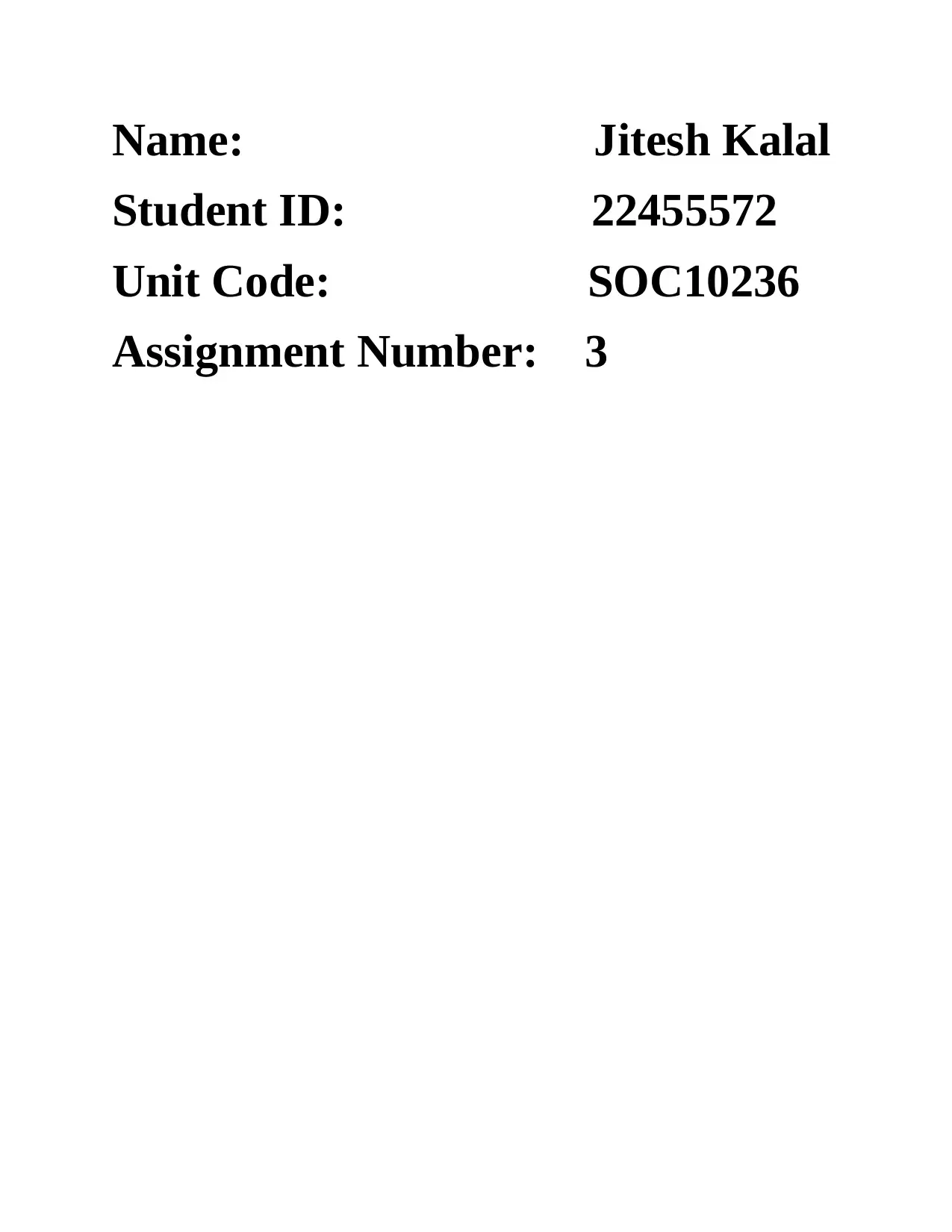
Name: Jitesh Kalal
Student ID: 22455572
Unit Code: SOC10236
Assignment Number: 3
Student ID: 22455572
Unit Code: SOC10236
Assignment Number: 3
Secure Best Marks with AI Grader
Need help grading? Try our AI Grader for instant feedback on your assignments.
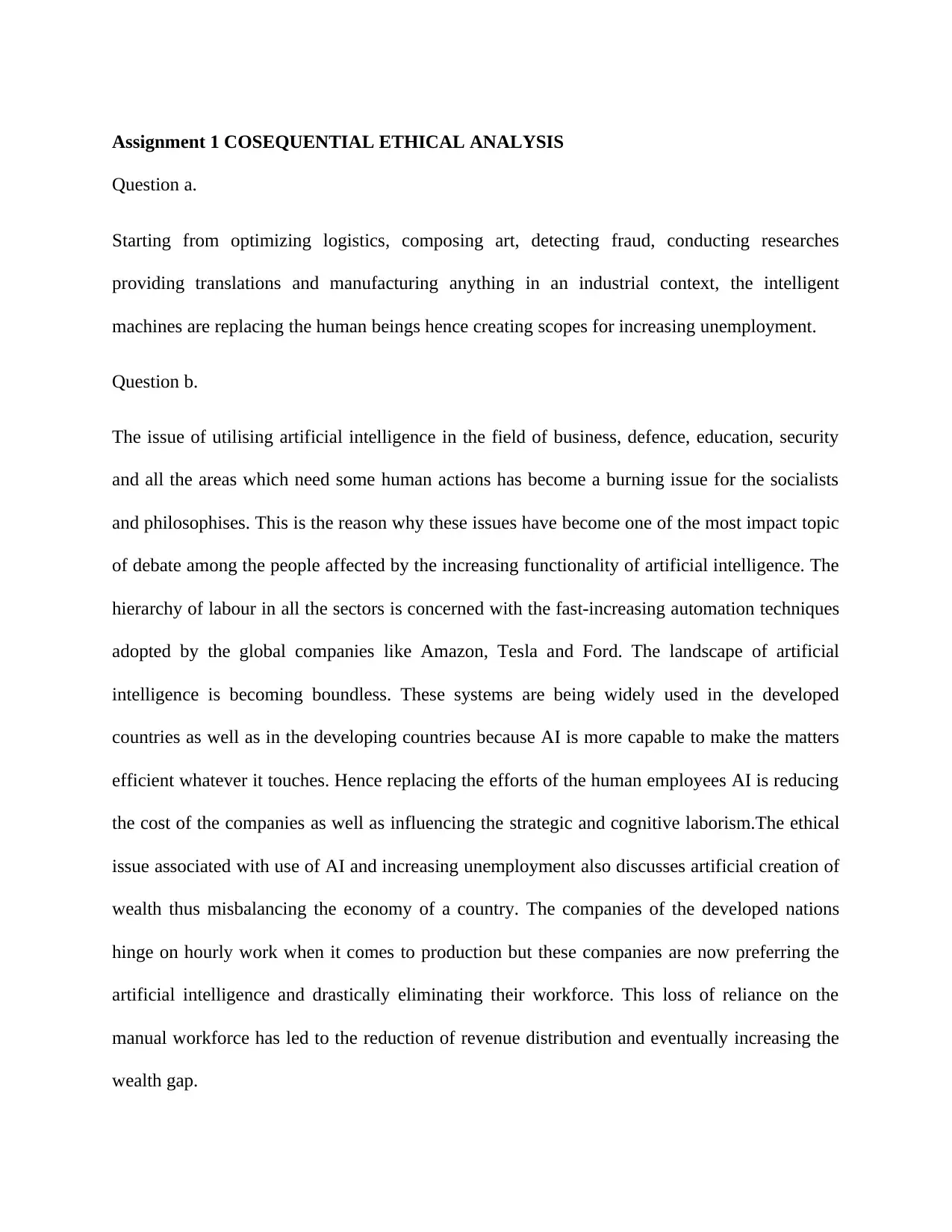
Assignment 1 COSEQUENTIAL ETHICAL ANALYSIS
Question a.
Starting from optimizing logistics, composing art, detecting fraud, conducting researches
providing translations and manufacturing anything in an industrial context, the intelligent
machines are replacing the human beings hence creating scopes for increasing unemployment.
Question b.
The issue of utilising artificial intelligence in the field of business, defence, education, security
and all the areas which need some human actions has become a burning issue for the socialists
and philosophises. This is the reason why these issues have become one of the most impact topic
of debate among the people affected by the increasing functionality of artificial intelligence. The
hierarchy of labour in all the sectors is concerned with the fast-increasing automation techniques
adopted by the global companies like Amazon, Tesla and Ford. The landscape of artificial
intelligence is becoming boundless. These systems are being widely used in the developed
countries as well as in the developing countries because AI is more capable to make the matters
efficient whatever it touches. Hence replacing the efforts of the human employees AI is reducing
the cost of the companies as well as influencing the strategic and cognitive laborism.The ethical
issue associated with use of AI and increasing unemployment also discusses artificial creation of
wealth thus misbalancing the economy of a country. The companies of the developed nations
hinge on hourly work when it comes to production but these companies are now preferring the
artificial intelligence and drastically eliminating their workforce. This loss of reliance on the
manual workforce has led to the reduction of revenue distribution and eventually increasing the
wealth gap.
Question a.
Starting from optimizing logistics, composing art, detecting fraud, conducting researches
providing translations and manufacturing anything in an industrial context, the intelligent
machines are replacing the human beings hence creating scopes for increasing unemployment.
Question b.
The issue of utilising artificial intelligence in the field of business, defence, education, security
and all the areas which need some human actions has become a burning issue for the socialists
and philosophises. This is the reason why these issues have become one of the most impact topic
of debate among the people affected by the increasing functionality of artificial intelligence. The
hierarchy of labour in all the sectors is concerned with the fast-increasing automation techniques
adopted by the global companies like Amazon, Tesla and Ford. The landscape of artificial
intelligence is becoming boundless. These systems are being widely used in the developed
countries as well as in the developing countries because AI is more capable to make the matters
efficient whatever it touches. Hence replacing the efforts of the human employees AI is reducing
the cost of the companies as well as influencing the strategic and cognitive laborism.The ethical
issue associated with use of AI and increasing unemployment also discusses artificial creation of
wealth thus misbalancing the economy of a country. The companies of the developed nations
hinge on hourly work when it comes to production but these companies are now preferring the
artificial intelligence and drastically eliminating their workforce. This loss of reliance on the
manual workforce has led to the reduction of revenue distribution and eventually increasing the
wealth gap.
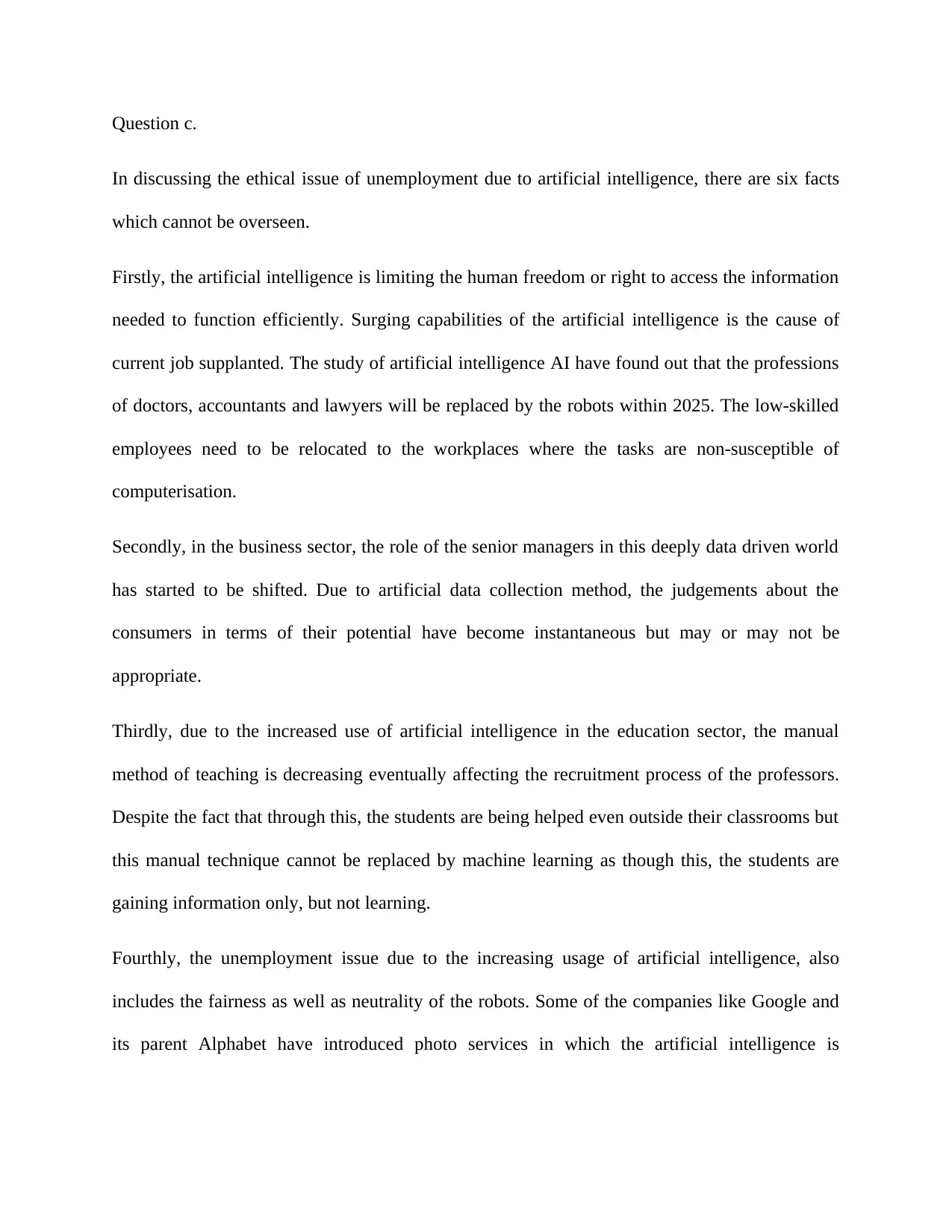
Question c.
In discussing the ethical issue of unemployment due to artificial intelligence, there are six facts
which cannot be overseen.
Firstly, the artificial intelligence is limiting the human freedom or right to access the information
needed to function efficiently. Surging capabilities of the artificial intelligence is the cause of
current job supplanted. The study of artificial intelligence AI have found out that the professions
of doctors, accountants and lawyers will be replaced by the robots within 2025. The low-skilled
employees need to be relocated to the workplaces where the tasks are non-susceptible of
computerisation.
Secondly, in the business sector, the role of the senior managers in this deeply data driven world
has started to be shifted. Due to artificial data collection method, the judgements about the
consumers in terms of their potential have become instantaneous but may or may not be
appropriate.
Thirdly, due to the increased use of artificial intelligence in the education sector, the manual
method of teaching is decreasing eventually affecting the recruitment process of the professors.
Despite the fact that through this, the students are being helped even outside their classrooms but
this manual technique cannot be replaced by machine learning as though this, the students are
gaining information only, but not learning.
Fourthly, the unemployment issue due to the increasing usage of artificial intelligence, also
includes the fairness as well as neutrality of the robots. Some of the companies like Google and
its parent Alphabet have introduced photo services in which the artificial intelligence is
In discussing the ethical issue of unemployment due to artificial intelligence, there are six facts
which cannot be overseen.
Firstly, the artificial intelligence is limiting the human freedom or right to access the information
needed to function efficiently. Surging capabilities of the artificial intelligence is the cause of
current job supplanted. The study of artificial intelligence AI have found out that the professions
of doctors, accountants and lawyers will be replaced by the robots within 2025. The low-skilled
employees need to be relocated to the workplaces where the tasks are non-susceptible of
computerisation.
Secondly, in the business sector, the role of the senior managers in this deeply data driven world
has started to be shifted. Due to artificial data collection method, the judgements about the
consumers in terms of their potential have become instantaneous but may or may not be
appropriate.
Thirdly, due to the increased use of artificial intelligence in the education sector, the manual
method of teaching is decreasing eventually affecting the recruitment process of the professors.
Despite the fact that through this, the students are being helped even outside their classrooms but
this manual technique cannot be replaced by machine learning as though this, the students are
gaining information only, but not learning.
Fourthly, the unemployment issue due to the increasing usage of artificial intelligence, also
includes the fairness as well as neutrality of the robots. Some of the companies like Google and
its parent Alphabet have introduced photo services in which the artificial intelligence is
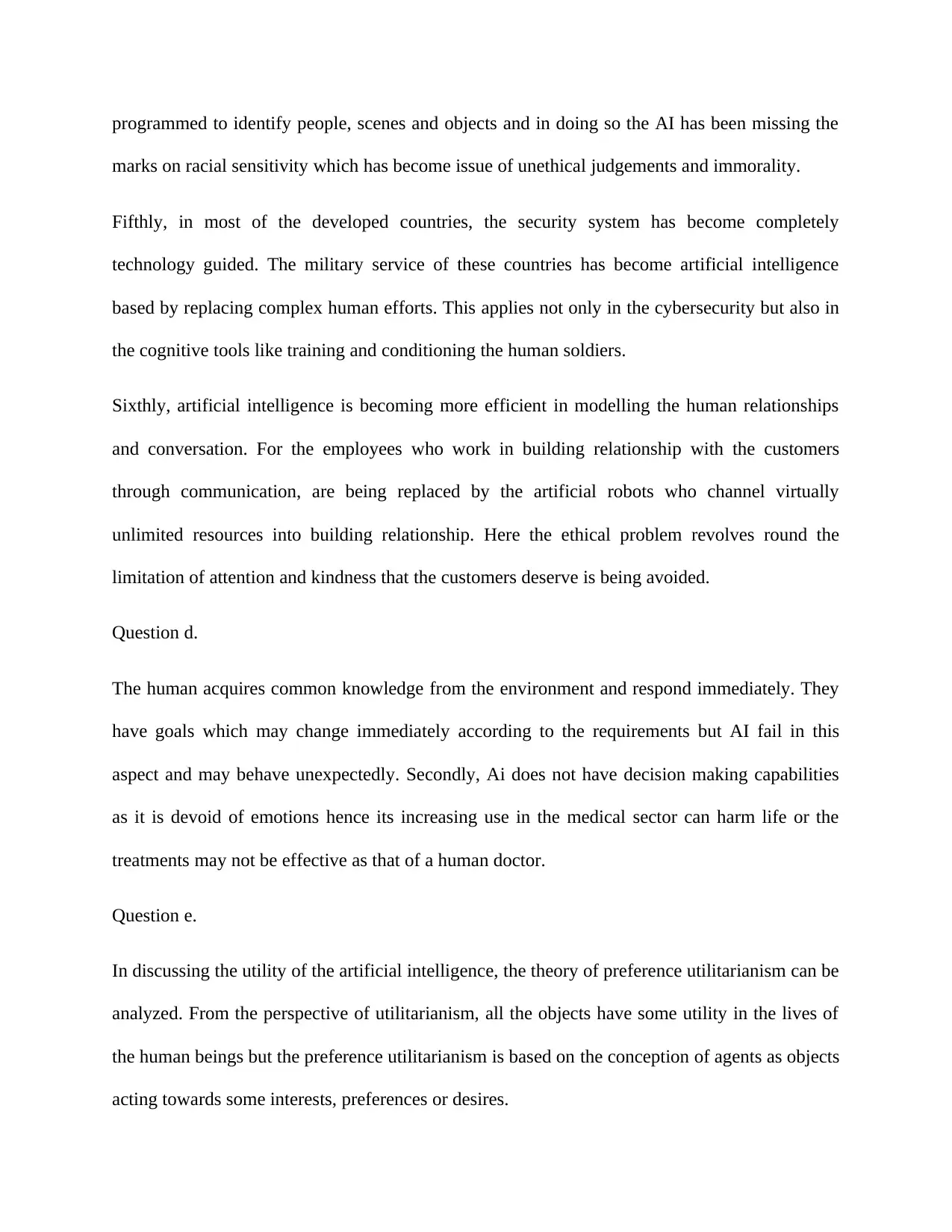
programmed to identify people, scenes and objects and in doing so the AI has been missing the
marks on racial sensitivity which has become issue of unethical judgements and immorality.
Fifthly, in most of the developed countries, the security system has become completely
technology guided. The military service of these countries has become artificial intelligence
based by replacing complex human efforts. This applies not only in the cybersecurity but also in
the cognitive tools like training and conditioning the human soldiers.
Sixthly, artificial intelligence is becoming more efficient in modelling the human relationships
and conversation. For the employees who work in building relationship with the customers
through communication, are being replaced by the artificial robots who channel virtually
unlimited resources into building relationship. Here the ethical problem revolves round the
limitation of attention and kindness that the customers deserve is being avoided.
Question d.
The human acquires common knowledge from the environment and respond immediately. They
have goals which may change immediately according to the requirements but AI fail in this
aspect and may behave unexpectedly. Secondly, Ai does not have decision making capabilities
as it is devoid of emotions hence its increasing use in the medical sector can harm life or the
treatments may not be effective as that of a human doctor.
Question e.
In discussing the utility of the artificial intelligence, the theory of preference utilitarianism can be
analyzed. From the perspective of utilitarianism, all the objects have some utility in the lives of
the human beings but the preference utilitarianism is based on the conception of agents as objects
acting towards some interests, preferences or desires.
marks on racial sensitivity which has become issue of unethical judgements and immorality.
Fifthly, in most of the developed countries, the security system has become completely
technology guided. The military service of these countries has become artificial intelligence
based by replacing complex human efforts. This applies not only in the cybersecurity but also in
the cognitive tools like training and conditioning the human soldiers.
Sixthly, artificial intelligence is becoming more efficient in modelling the human relationships
and conversation. For the employees who work in building relationship with the customers
through communication, are being replaced by the artificial robots who channel virtually
unlimited resources into building relationship. Here the ethical problem revolves round the
limitation of attention and kindness that the customers deserve is being avoided.
Question d.
The human acquires common knowledge from the environment and respond immediately. They
have goals which may change immediately according to the requirements but AI fail in this
aspect and may behave unexpectedly. Secondly, Ai does not have decision making capabilities
as it is devoid of emotions hence its increasing use in the medical sector can harm life or the
treatments may not be effective as that of a human doctor.
Question e.
In discussing the utility of the artificial intelligence, the theory of preference utilitarianism can be
analyzed. From the perspective of utilitarianism, all the objects have some utility in the lives of
the human beings but the preference utilitarianism is based on the conception of agents as objects
acting towards some interests, preferences or desires.
Paraphrase This Document
Need a fresh take? Get an instant paraphrase of this document with our AI Paraphraser
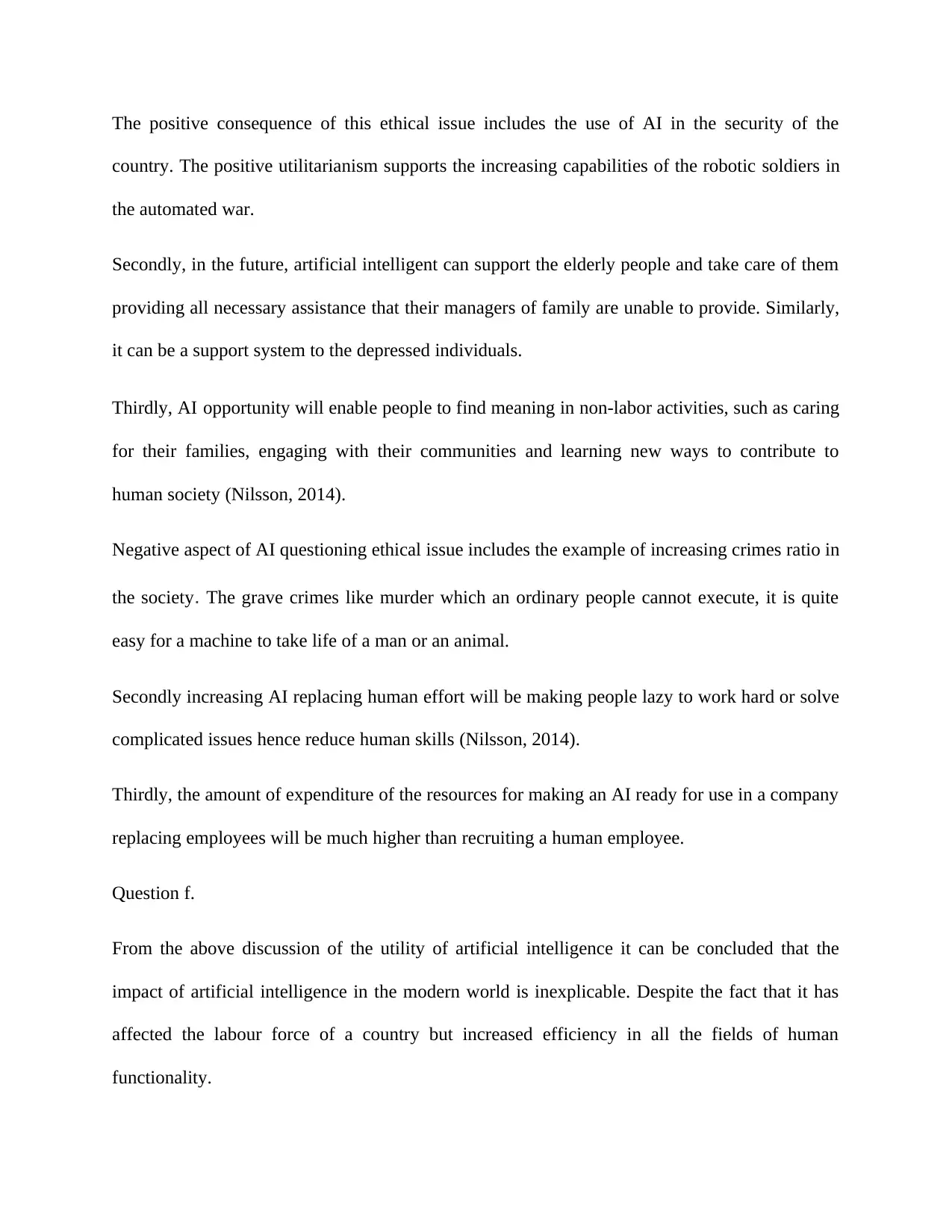
The positive consequence of this ethical issue includes the use of AI in the security of the
country. The positive utilitarianism supports the increasing capabilities of the robotic soldiers in
the automated war.
Secondly, in the future, artificial intelligent can support the elderly people and take care of them
providing all necessary assistance that their managers of family are unable to provide. Similarly,
it can be a support system to the depressed individuals.
Thirdly, AI opportunity will enable people to find meaning in non-labor activities, such as caring
for their families, engaging with their communities and learning new ways to contribute to
human society (Nilsson, 2014).
Negative aspect of AI questioning ethical issue includes the example of increasing crimes ratio in
the society. The grave crimes like murder which an ordinary people cannot execute, it is quite
easy for a machine to take life of a man or an animal.
Secondly increasing AI replacing human effort will be making people lazy to work hard or solve
complicated issues hence reduce human skills (Nilsson, 2014).
Thirdly, the amount of expenditure of the resources for making an AI ready for use in a company
replacing employees will be much higher than recruiting a human employee.
Question f.
From the above discussion of the utility of artificial intelligence it can be concluded that the
impact of artificial intelligence in the modern world is inexplicable. Despite the fact that it has
affected the labour force of a country but increased efficiency in all the fields of human
functionality.
country. The positive utilitarianism supports the increasing capabilities of the robotic soldiers in
the automated war.
Secondly, in the future, artificial intelligent can support the elderly people and take care of them
providing all necessary assistance that their managers of family are unable to provide. Similarly,
it can be a support system to the depressed individuals.
Thirdly, AI opportunity will enable people to find meaning in non-labor activities, such as caring
for their families, engaging with their communities and learning new ways to contribute to
human society (Nilsson, 2014).
Negative aspect of AI questioning ethical issue includes the example of increasing crimes ratio in
the society. The grave crimes like murder which an ordinary people cannot execute, it is quite
easy for a machine to take life of a man or an animal.
Secondly increasing AI replacing human effort will be making people lazy to work hard or solve
complicated issues hence reduce human skills (Nilsson, 2014).
Thirdly, the amount of expenditure of the resources for making an AI ready for use in a company
replacing employees will be much higher than recruiting a human employee.
Question f.
From the above discussion of the utility of artificial intelligence it can be concluded that the
impact of artificial intelligence in the modern world is inexplicable. Despite the fact that it has
affected the labour force of a country but increased efficiency in all the fields of human
functionality.
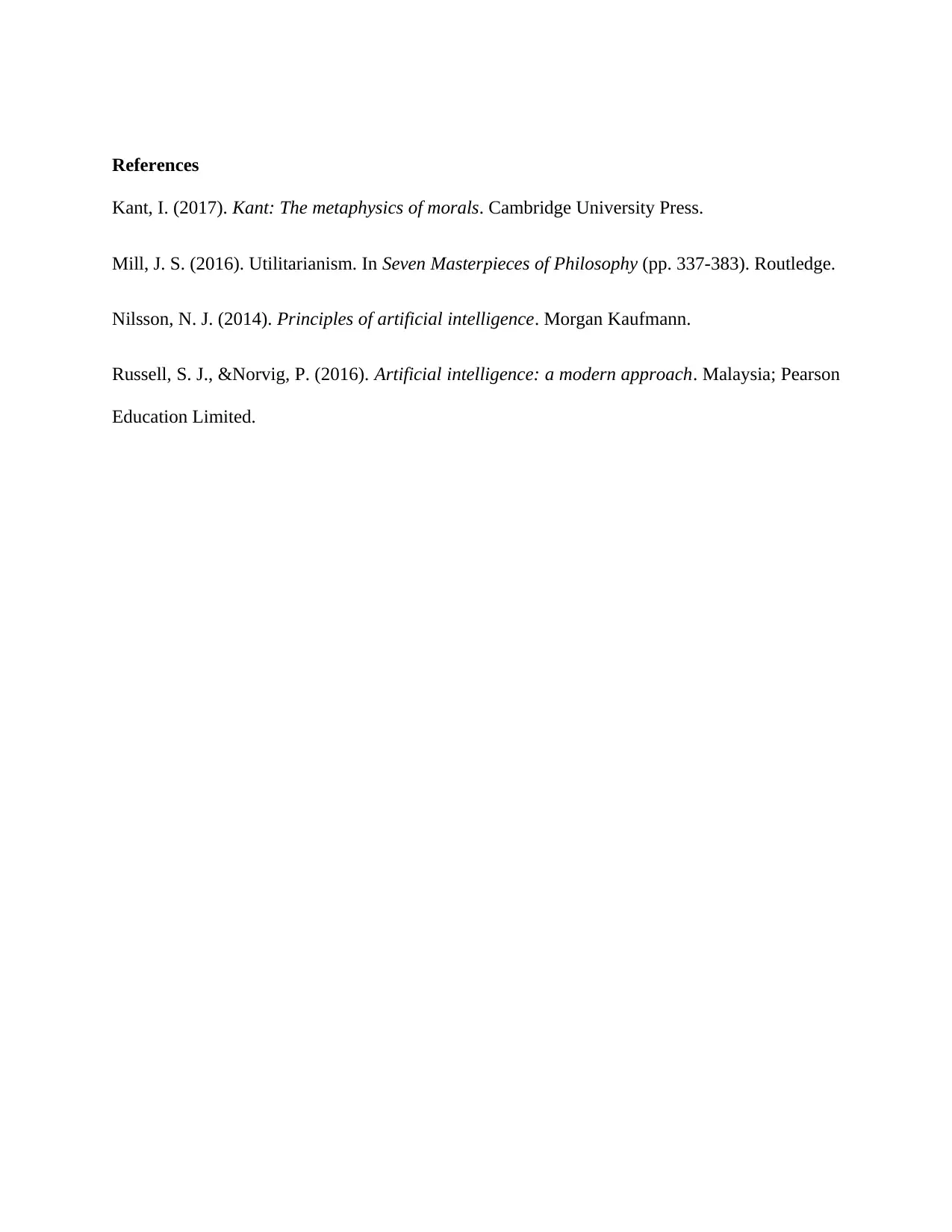
References
Kant, I. (2017). Kant: The metaphysics of morals. Cambridge University Press.
Mill, J. S. (2016). Utilitarianism. In Seven Masterpieces of Philosophy (pp. 337-383). Routledge.
Nilsson, N. J. (2014). Principles of artificial intelligence. Morgan Kaufmann.
Russell, S. J., &Norvig, P. (2016). Artificial intelligence: a modern approach. Malaysia; Pearson
Education Limited.
Kant, I. (2017). Kant: The metaphysics of morals. Cambridge University Press.
Mill, J. S. (2016). Utilitarianism. In Seven Masterpieces of Philosophy (pp. 337-383). Routledge.
Nilsson, N. J. (2014). Principles of artificial intelligence. Morgan Kaufmann.
Russell, S. J., &Norvig, P. (2016). Artificial intelligence: a modern approach. Malaysia; Pearson
Education Limited.
1 out of 6
![[object Object]](/_next/static/media/star-bottom.7253800d.svg)





